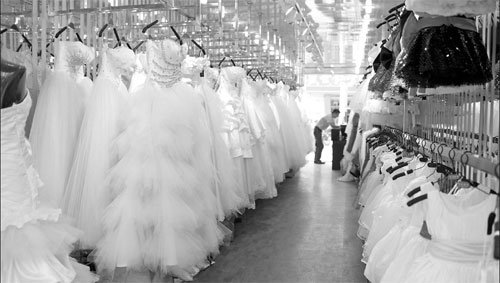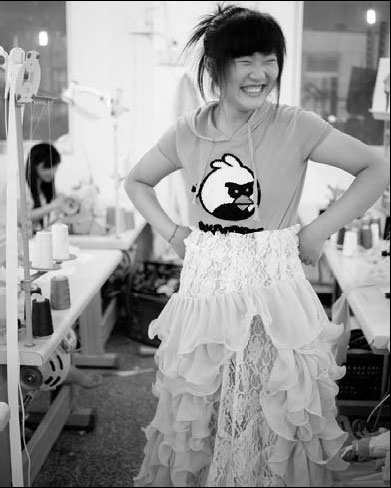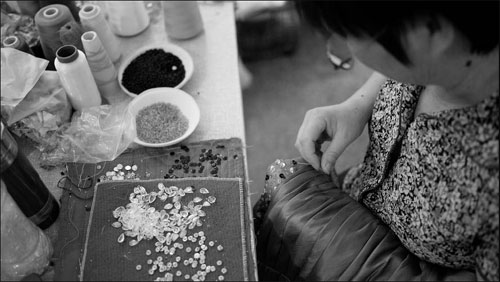Wedding dress firms unveil top figures
Updated: 2012-07-30 07:53
By Chen Limin in Suzhou, Jiangsu (China Daily)
|
||||||||
|
A wedding dress shop in the Huqiu district of Suzhou city. Huqiu is the location of more than 1,200 wedding dressmakers and vendors, making it the country's leading wedding dress producing and business center. Photos by Wang Dingye / For China Daily |
|
"Will there be one day that I can wear a wedding dress like this for my own wedding?" With a big smile a woman poses the question to her colleagues at a workshop in Suzhou that supplies Zhao Xiaogang with wedding dresses. |
|
A worker making a wedding dress at a factory in Suzhou that supplies Zhao Xiaogang. Zhao sells them to European customers. |
Overseas sales boom as hard-pressed customers seek quality at good prices from online stores
After a good lie-in in the morning, Zhao Xiaogang, an online wedding dress seller, gets up in time for the busy part of the day.
E-mails from foreign customers usually soar in the afternoon. A short trip to wedding dressmakers may be needed to supplement the stock. Wedding dresses in the warehouse are awaiting packaging before being sent to express delivery companies that will eventually take them to Germany.
The 32-year-old Web entrepreneur has managed to sell wedding dresses to the European market while sitting at home in Suzhou, a major wedding dress production center in China.
There are 1,200 wedding dressmakers and vendors in the city, in East China's Jiangsu province, known for its silk and embroidery. It makes up about 60 percent of the total wedding dress output of the country, according to Jin Debao, vice-chairman of the industry association.
Brides-to-be can stroll around meandering streets between one wedding dress shop and another for a whole day to find an ideal match of quality and price. About 80 percent of Suzhou's wedding dresses go to Chinese customers, said Jin.
This, however, doesn't stop some from trying their hand in overseas markets, evidenced in notices advertising for workers to take foreign orders in the city's wedding dress manufacturing area.
Zhao, who started to sell wedding dresses online on eBay.com in 2010, is one of them.
"Chinese customers like to compare and haggle over prices and there are also a lot of vendors selling wedding dresses," he said. "So I tried to sell overseas and, since most of my peers target the United States and the United Kingdom, I chose another way by selling to Germany."
This was not a small challenge for him because he speaks neither a single word of English nor German and he learned about the Internet only four years ago.
"Every time I reply to customers' e-mails, I go to Google Translator, going sentence by sentence," he said. "But I cannot manage if there are direct phone calls from them."

There have been few calls from buyers, fortunately, and Zhao, together with his wife and brother-in-law, manages to make his life "much better" than in his previous job as a warehouse worker.
His online business earns a profit of 30,000 to 40,000 yuan ($4,708 to $6,277) a month on average by selling wedding dresses worth $80,000 to $90,000 in total.
In the house he rents, also his workplace, wedding dresses for sale are piled up, ready to meet daily demand. If there needs to be a tailor-made adjustment to a particular one, Zhao's suppliers can finish making it in just a few days, with everything related to wedding dress manufacturing in the neighborhood.
In Suzhou, there are 13 wedding dress vendors that record a monthly transaction volume through PayPal of more than $30,000, with the biggest seller's reaching nearly $970,000, according to figures from PayPal Inc, the online payment arm of online marketplace eBay Inc.
While Zhao's family-based online store represents the nimble, small vendors, some others have grown into bigger businesses thanks to the city's manufacturing cluster.
Zhu Ningfeng, a teacher-turned-entrepreneur, has been focused on wedding dress selling since 2006 with two of his friends because they "have considerable demand overseas and they are mainly produced in China, suitable for online sales".
Unlike Zhao, whose wedding dresses are priced between 70 to 150 euros ($86 to $184), targeting the low-end market, Zhu's online shop, Vponsale, aims at the middle market with an averaged price of 350 euros.
It marks itself out by having its own design team to avoid providing the same wedding dresses as others.
Zhu sources materials from three manufacturers in Suzhou and four in Guangdong province. Transaction volumes on the website have increased tenfold from 2009 to 2011, with total sales of 40 million yuan last year, said Zhu.
While the euro debt crisis and the slowdown of the US economy have hit overseas orders in different manufacturing sectors, Zhu said his online shop hasn't yet felt the pinch. "Many customers may turn to online stores that provide quality products at reasonable prices during a weak economic climate," he said.
He does face a challenge though, just like many other Chinese enterprises that have manufacturing advantages but have a lot to learn in making themselves known by international customers.
"The most difficult thing is how to get a customer, how to make yourself different from others who sell the same products online," he said.
His solution is to get as many hits as possible by setting up his own Web page on social networks, such as Facebook.com and Twitter.com, and uploading photos and videos of his own wedding dresses on popular websites such as Youtube.com.
Expansion into more markets is the next big solution. The company has started to sell to the Middle East and South Africa.
Tapping into emerging markets has been an increasingly common practice for many e-commerce websites. In the first quarter of this year, Chinese exports to Brazil, Russia and India via e-commerce went up 79 percent from the same period last year, compared with 35 percent to the US, said Alan Tien, PayPal general manager of China.
PayPal's total transaction volume in the Chinese mainland, Taiwan and Hong Kong was huge in 2010, reaching $4.4 billion on year-on-year double-digit growth, he said, expecting such a growth rate to continue in the years to come.
PayPal is what the majority of Chinese e-commerce websites use to receive payment and to conduct international marketing based on the service's 110 million buyers across the world.
chenlimin@chinadaily.com.cn
(China Daily 07/30/2012 page16)

 Relief reaches isolated village
Relief reaches isolated village
 Rainfall poses new threats to quake-hit region
Rainfall poses new threats to quake-hit region
 Funerals begin for Boston bombing victims
Funerals begin for Boston bombing victims
 Quake takeaway from China's Air Force
Quake takeaway from China's Air Force
 Obama celebrates young inventors at science fair
Obama celebrates young inventors at science fair
 Earth Day marked around the world
Earth Day marked around the world
 Volunteer team helping students find sense of normalcy
Volunteer team helping students find sense of normalcy
 Ethnic groups quick to join rescue efforts
Ethnic groups quick to join rescue efforts
Most Viewed
Editor's Picks

|

|

|

|

|

|
Today's Top News
Health new priority for quake zone
Xi meets US top military officer
Japan's boats driven out of Diaoyu
China mulls online shopping legislation
Bird flu death toll rises to 22
Putin appoints new ambassador to China
Japanese ships blocked from Diaoyu Islands
Inspired by Guan, more Chinese pick up golf
US Weekly

|

|









